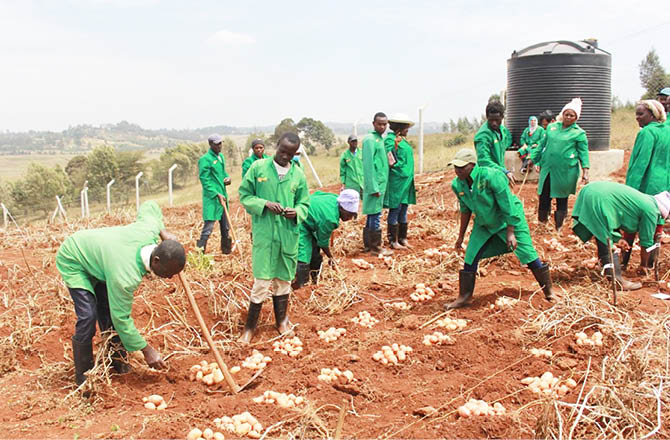Scientists from various countries are working to develop potato varieties that will be free from the destructive late blight disease.
Through confined field trials (CFTs) in Kenya’s Muguga, Njabini and Molo potato-growing districts, the researchers are currently assessing the potentials of four genetically modified biotech potato types.
Dr Catherine Taracha, the project’s Principal Investigator (PI) at Kenya Agricultural and Livestock Research Organization (KALRO), stated that information gathered from the CFTs will be assessed to help determine which varieties should move on to National Performance Trials (NPTs).
The Principal Investigator said that the potato industry is beset by a number of issues throughout the crop’s harvest at the Muguga CFT. One of these issues is potato late blight, whose management continues to be a significant difficulty, particularly for smallholder farmers in the potato-growing regions of Kenya. These farmers must spray up to 20 times with pesticides to control late blight in order to have a fair yield.
- NGO seeks students’ participation in AU summits, assemblies
- 10 die as Jigawa records 91 suspected diphtheria cases
“Potato is a key food as well as cash crop in the highlands of Kenya and is extensively produced by smallholder farmers. It is the second most significant food crop in Kenya after maize, employing over 2.5 million persons. It plays a key role in Kenyan food security and contributes to alleviation of poverty,” said Dr Taracha.
She added that about 30 to 60 percent of the potato crop is lost to the late blight yearly in Kenya. “The inability of resource-strained farmers to control late blight, the optimum management of the disease in Kenya is likely to be achieved through development of biotech varieties and this is currently being conducted in the country in a project termed the Global Biotech Potato Partnership,” she pointed out.
According to Mr. Erick Korir, principal biosafety officer at the National Biosafety Authority (NBA), the organisation has given KALRO and other project partners permission to conduct late blight disease trials for three seasons as part of the multi-location CFTs (ML-CFTs) in the nation. This will allow for the collection of sufficient data to inform the project’s next phase.
Mr. Korir expressed satisfaction with the biosafety procedures at the CFT site, pointing out that because biotech crops use foreign genes, field testing is done under strict guidelines, so the tested biotech varieties must stay on the CFT trial site until they have received NBA approval for release into the environment.
The project seeks to address the lingering problem of late blight disease by creating and making available potato varieties that are resistant to the disease.
Experts said that if the biotech varieties are eventually made available to farmers through the research project run by Kenya Agricultural and Livestock Research Organization (KALRO) in Kenya under the Feed the Future Global Biotech Potato Partnership project, there is hope for the sustainability of potato farming in Kenya.
When compared to conventional types that have been severely impacted by late blight, the harvest from the second round of ML-CFTs demonstrates that the biotech potatoes have a yield advantage and do not require a single chemical spray.
According to Dr Taracha, the research aims to provide farmers with late blight-resistant potato varieties within two years, and they will hasten the introduction of the new kinds to increase harvests and farmers’ income from the sale of surplus produce.
Projects related to the Feed the Future Global Biotech Potato Partnership are being carried out in four nations: Kenya, Nigeria, Bangladesh and Indonesia. It is coordinated by Michigan State University and involves a number of partners, such as the International Potato Center (CIP) in Africa, KALRO, and the AATF.
The project leader in Kenya and from CIP, Dr Eric Magembe, noted that as a biotechnologist, he is aware personally of the losses experienced by farmers. He pointed out that information from the current ML-CFTs will help choose the best varieties to distribute to farmers and eventually enhance potato output for food and nutritional security as well as for revenues. The environment and the general health of farmers will benefit from the use of less chemicals to combat the disease in these GMO potatoes.

 Join Daily Trust WhatsApp Community For Quick Access To News and Happenings Around You.
Join Daily Trust WhatsApp Community For Quick Access To News and Happenings Around You.